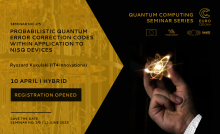Annotation
The main aim of this talk is to introduce the concept of probabilistic quantum error correction (QEC) codes. During the talk we will show that the usage of probabilistic quantum error correction codes can improve the quality of quantum systems disturbed by general noise channels. In particular, we are able to reduce the number of data qubits used for QEC code implementation. We will discuss generalizations of the Kill-Laflamme theorem, and formulate the necessary and sufficient conditions to check if a given noise channel is probabilistically correctable. Moreover, we will indicate a trade-off between the probability that our error-correcting procedure will successfully terminate and the quality of the code, which can be measured by the fidelity function. As an engineering aspect of this presentation, we will demonstrate a numerically efficient algorithm to construct an approximate QEC codes and investigate its effectiveness. The quality will be tested both on a simulator as well as on the real quantum device. We will use publicly available IBM quantum computers.
Benefits for the attendees, what they will learn:
Attendees will get better understanding of quantum error correction techniques seen from the theoretical point of view. Important theorems and QEC conditions will be mentioned. Finally, they will have opportunity to observe the process of error correcting codes creation - starting from theoretical consideration, up to implementation of the scheme on quantum computer. Attendees will get a opportunity to familiarize with Qiskit Python package and architecture of IBM Quantum devices.
Level
beginner
Language
English
Prerequisites
Basics knowledge of Quantum Information Theory
Basics knowledge of gate-based quantum computing
Basics knowledge of Python
Tutor
Ryszard Kukulski
Ryszard Kukulski is a post-doc at IT4Innovations. He has contributed to research in quantum error correction, focusing on probabilistic computation and optimization of resources needed for quantum computing. His prior works covered variety of subjects from quantum information theory. He is an author of scalable benchmarking procedure based on heavy output generation problem. In his articles, Ryszard utilized random quantum matrix ensembles to create generative schemes with application to error correction, benchmarking and quantum measurement discrimination.
